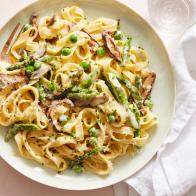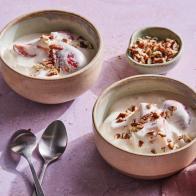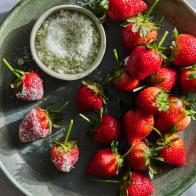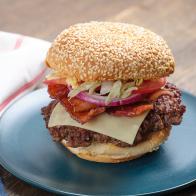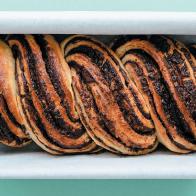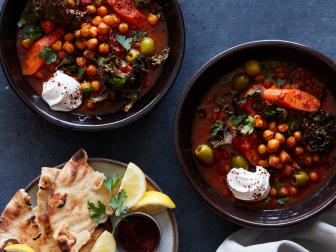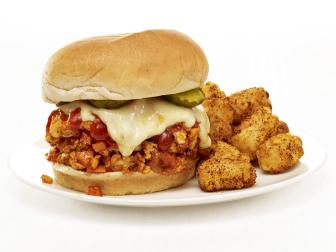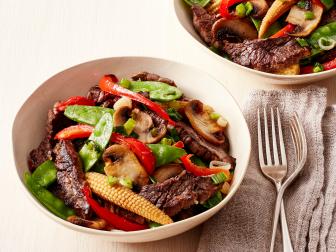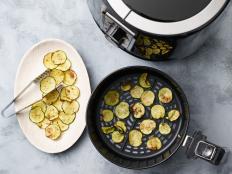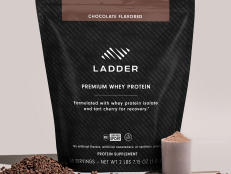Your 4-Week Plan to Eating Healthier in 2021
All it takes is a little planning to turn your healthy eating goals into life-long habits.


vaaseenaa/Getty Images
Every year, millions of people start the new year with a plan to eat healthier. Whether that means adopting a temporary diet like Whole30 with the intention of "resetting" after the holidays, or a full week of 6 a.m. Peloton workouts, jumping to the extreme ends of the wellness spectrum can put of us right back where we started pre-January 1 because we try to do too much too fast. Instead of completely overhauling our diet and workout routines, we're trying something else this year: a gradual fresh start.
We're taking a whole month to try three research-backed and expert-recommended habits that can make our lives healthier without resulting in a feeling of total change. Eating more fruits and vegetables, reducing meat consumption and rethinking sugar and alcohol consumption are habits we all could benefit from.
Before you dive into this four-week plan, remember to be gentle with yourself. This last year was difficult and lead to many life changes that we're still grappling with. Living a healthful lifestyle isn't about doing everything perfectly. Even the smallest changes can make a big difference.
Week 1: Eat (More) Fruits and Vegetables Every Day

Oscar Wong/Getty Images
According to the Centers for Disease Control and Prevention (CDC), very few Americans get the recommended amount of five servings of fruits and vegetables daily. To be honest, there are some days when we find we don't really eat any at all. (Hello, football Sundays.)
Incorporating more fruits and vegetables into your diet doesn't mean you have to eat a salad for every meal — in fact, we wouldn't recommend that. Instead, you can add produce to meals you already love. For example, add spinach to your fruit smoothie, sweet potato to your favorite beef chili, or add some veggie noodles to your spaghetti and meatballs. These small additions are easy ways to add servings of veggies quickly and deliciously.
To eat more fruit, thinking about substitutes and snacks can be helpful. Instead of berry-flavored fruit snacks, try actually munching on a handful of berries. Add an apple to your lunchtime routine. Or plan to drink a fruit smoothie as a breakfast or post-workout snack.
Week 2: Eat Less Meat

Alexander Spatari/Getty Images
Meatless Monday has been a well-known slogan for years, but for many, the concern around a meatless meal is usually about a lack of protein and feeling of fullness. Protein is linked to feeling fuller longer, but that doesn't mean the protein needs to be an animal source.
Meatless Meal Plans from Food Network Kitchen
In 2020 we dealt with meat shortages and, as a result, meat alternative products showed up in many of our shopping carts. Plant-based proteins like beans and tofu are good sources of protein and other nutrients like fiber. Dairy products like milk, yogurt and cheese are also good sources of protein, and fit well flexitarian and vegetarian diet plans.
Make Meat-Free Dishes in Food Network Kitchen Classes
Look at finding new protein sources as an opportunity to try new recipes. In addition to new flavors and cooking techniques, you may also find yourself saving money on your grocery bill when you're buying less meat — especially red meat.
Week 3: Balance Out Indulgences Like Sugar and Alcohol

Westend61/Getty Images
According to the new USDA Dietary Guidelines released this year, added sugar, alcohol and saturated fat should only account for 15% or less of one's daily calorie intake — about 300 calories of a 2,000 calorie diet. This doesn't mean avoiding indulgent foods altogether, but finding a balance is key. Take stock of what you're eating for a week or two and see where you could be making healthier choices.
Are you having more than one alcoholic drink per day? Instead of going full-on Dry January, consider drinking only on weekends or swapping the second glass of wine for a glass of water. If you love a glass of red with dinner, you don't need to give it up entirely. But more than one glass puts many people over that 15% mark before factoring in added sugars or saturated fat.
If you find you're eating half a bag of chips or more than a handful of cookies before bed, portion control can help. Portion out a serving of your snack in a bowl, and once you're done, give yourself a few minutes to really decide if you want more. You can also consider swapping a sugary snack for a piece of fruit to reduce your intake of added sugar.
Week 4: Put It All Together
Having a plan for what you're going to eat for the week can make healthier choices even easier. Create a meal plan around new recipes you want to try, and snacks you know you'd prefer to eat. Even factor in a cocktail hour on Friday — we all need to have fun food in our lives.
Healthy Food Network Kitchen Meal Plans to Save
Keep your fridge stocked with fruit, vegetables and easy-to-grab snacks like hummus cups, apples and high-protein hard-boiled eggs. If you can easily access the healthier options, you're more likely to choose them instead of searching for chips in an overcrowded pantry.
And finally, don't forget to hydrate. Many of the times we reach for a salty or sugary snack, we're actually dehydrated. Get a big water bottle and fill it up in the morning with the goal to finish it before bed. You might find that other health-related goals come easier when you're drinking enough water.
*This article has been written and/or reviewed by a nutritionist.
Related Links:
